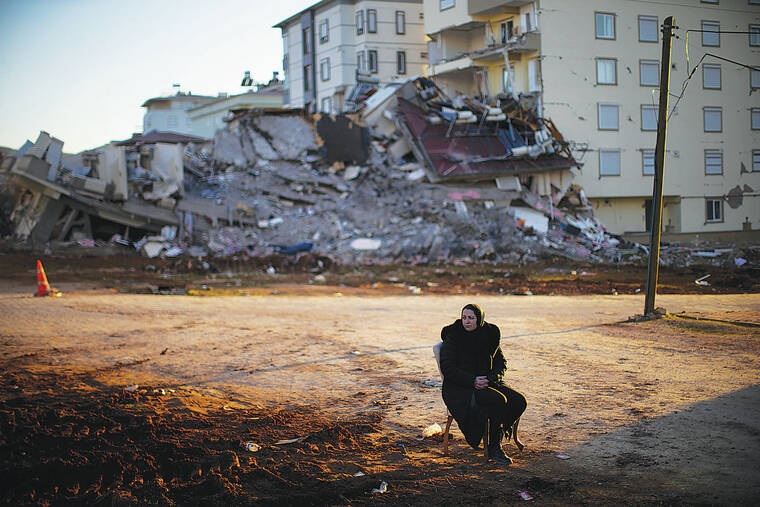Search for earthquake survivors enters final hours in Turkey
ADIYAMAN, Turkey — The desperate search for earthquake survivors in Turkey and Syria entered its final hours Monday as rescuers using sniffer dogs and thermal cameras surveyed pulverized apartment blocks for any sign of life a week after the disaster.
Teams in southern Turkey’s Hatay province cheered and clapped when a 13-year-old boy identified only by his first name, Kaan, was pulled from the rubble. In Gaziantep province, rescue workers, including coal miners who secured tunnels with wooden supports, found a woman alive in the wreckage of a five-story building.
ADVERTISING
Stories of such rescues have flooded the airwaves in recent days. But tens of thousands of dead have been found during the same period, and experts say the window for rescues has nearly closed, given the length of time that has passed, the fact that temperatures have fallen to minus 6 degrees Celsius (21 degrees Fahrenheit) and the severity of the building collapses.
The 7.8 magnitude earthquake and its aftershocks struck southeastern Turkey and northern Syria on Feb. 6, reducing huge swaths of towns and cities to mountains of broken concrete and twisted metal. The death toll has surpassed 35,000.
In some areas, searchers placed signs that read “ses yok,” or “no sound,” in front of buildings they had inspected for any sign that someone was alive inside, HaberTurk television reported.
Associated Press journalists in Adiyaman saw a sign painted on a concrete slab in front of wreckage indicating that an expert had inspected it. In Antakya, people left signs displaying their phone numbers and asking crews to contact them if they found any bodies in the rubble.
The quake’s financial damage in Turkey alone was estimated at $84.1 billion, according to the Turkish Enterprise and Business Confederation, a non-governmental business organization. Calculated using a statistical comparison with a similarly devastating 1999 quake, the figure was considerably higher than any official estimates so far.
In other developments, Syria’s president agreed to open two new crossing points from Turkey to the country’s rebel-held northwest to deliver desperately needed aid and equipment for millions of earthquake victims, the United Nations announced.
U.N. Secretary-General Antonio Guterres welcomed the decision by Syrian leader Bashar Assad to open crossing points at Bab Al-Salam and Al Raée for an initial period of three months. Currently, the U.N. has only been allowed to deliver aid to the northwest Idlib area through a single crossing at Bab Al-Hawa.
Some 100 kilometers (62 miles) from the epicenter, almost no houses were left standing in the Turkish village of Polat, where residents salvaged refrigerators, washing machines and other goods from wrecked homes.
Not enough tents have arrived for the homeless, forcing families to share the tents that are available, survivor Zehra Kurukafa said.
“We sleep in the mud, all together with two, three, even four families,” Kurukafa said.
Turkish authorities said Monday that more than 150,000 survivors have been moved to shelters outside the affected provinces. In the city of Adiyaman, Musa Bozkurt waited for a vehicle to bring him and others to western Turkey.
“We’re going away, but we have no idea what will happen when we get there,” said the 25-year-old. “We have no goal. Even if there was (a plan), what good will it be after this hour? I no longer have my father or my uncle. What do I have left?”
Fuat Ekinci, a 55-year-old farmer, was reluctant to leave his home for western Turkey, saying he did not have the means to live elsewhere and that his fields need to be tended.
“Those who have the means are leaving, but we’re poor,” he said. “The government says, go and live there a month or two. How do I leave my home? My fields are here, this is my home, how do I leave it behind?”
Volunteers from across Turkey have mobilized to help millions of survivors, including a group of chefs and restaurant owners who served traditional food such as beans and rice and lentil soup to survivors who lined up in the streets of downtown Adiyaman.
The widespread damage included heritage sites in places such as Antakya, on the southern coast of Turkey, an important ancient port and early center of Christianity.


